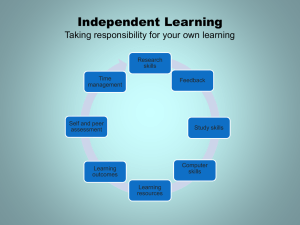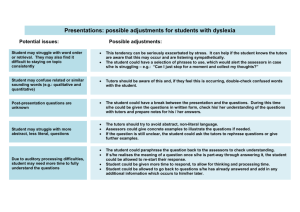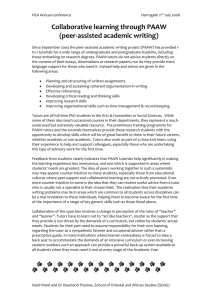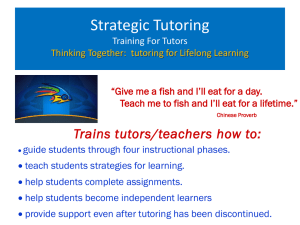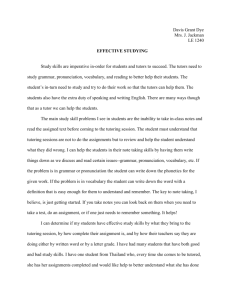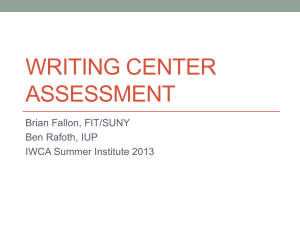Helping ESL Students
advertisement
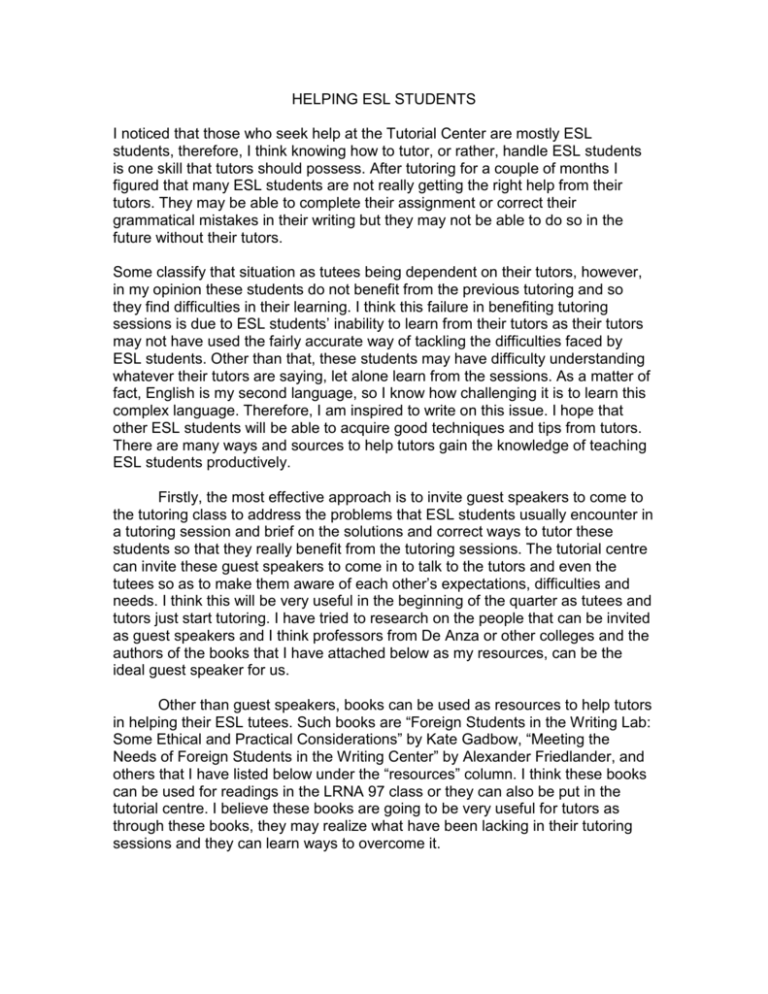
HELPING ESL STUDENTS I noticed that those who seek help at the Tutorial Center are mostly ESL students, therefore, I think knowing how to tutor, or rather, handle ESL students is one skill that tutors should possess. After tutoring for a couple of months I figured that many ESL students are not really getting the right help from their tutors. They may be able to complete their assignment or correct their grammatical mistakes in their writing but they may not be able to do so in the future without their tutors. Some classify that situation as tutees being dependent on their tutors, however, in my opinion these students do not benefit from the previous tutoring and so they find difficulties in their learning. I think this failure in benefiting tutoring sessions is due to ESL students’ inability to learn from their tutors as their tutors may not have used the fairly accurate way of tackling the difficulties faced by ESL students. Other than that, these students may have difficulty understanding whatever their tutors are saying, let alone learn from the sessions. As a matter of fact, English is my second language, so I know how challenging it is to learn this complex language. Therefore, I am inspired to write on this issue. I hope that other ESL students will be able to acquire good techniques and tips from tutors. There are many ways and sources to help tutors gain the knowledge of teaching ESL students productively. Firstly, the most effective approach is to invite guest speakers to come to the tutoring class to address the problems that ESL students usually encounter in a tutoring session and brief on the solutions and correct ways to tutor these students so that they really benefit from the tutoring sessions. The tutorial centre can invite these guest speakers to come in to talk to the tutors and even the tutees so as to make them aware of each other’s expectations, difficulties and needs. I think this will be very useful in the beginning of the quarter as tutees and tutors just start tutoring. I have tried to research on the people that can be invited as guest speakers and I think professors from De Anza or other colleges and the authors of the books that I have attached below as my resources, can be the ideal guest speaker for us. Other than guest speakers, books can be used as resources to help tutors in helping their ESL tutees. Such books are “Foreign Students in the Writing Lab: Some Ethical and Practical Considerations” by Kate Gadbow, “Meeting the Needs of Foreign Students in the Writing Center” by Alexander Friedlander, and others that I have listed below under the “resources” column. I think these books can be used for readings in the LRNA 97 class or they can also be put in the tutorial centre. I believe these books are going to be very useful for tutors as through these books, they may realize what have been lacking in their tutoring sessions and they can learn ways to overcome it. Another thing I did for this project is interview experienced tutors and instructors on how they managed to validate their students or tutees learning. I interviewed five instructors and ten tutors. Most of the instructors told me that they ask questions to make sure that their students are paying attention. They also give out exercises to test what their students have learnt and what needed to be taught again. All the tutors said that they ask what their tutees have learnt at the end of the session. Some of them also ask questions amidst the session to make sure that their tutees understand the lesson so far before moving on. I think giving exercises, asking questions to check whether tutees are paying attention, asking what they have learnt at the end of the session, and asking them questions amidst the session before continuing to teach are means tutors could use. There are of course many other approaches that tutors can use. I hope that other tutors could respond to this essay and suggest another way of helping tutors help ESL tutees. ESL students may be the challenging to tutor but if we could help them overcome their difficulties in learning English, it would be wonderful and it would be an achievement that all tutors can be proud of. Resources: Gadbow, Kate. “Foreign Students in the Writing Lab: Some Ethical and Practical Considerations.” WLN 17.3 (1992): 1-5. Harris, Muriel. “Cultural Conflicts in the Writing Center: Expectations and Assumptions of ESL Students.” Writing in Multicultural Settings. Ed. Carol Severino, Juan C. Guerra, and Johnnella E. Butler. New York: MLA, 1997. 220233. Harris, Muriel and Tony Silva. "Tutoring ESL Students: Issues and Options." CCC 44 (1993): 525- 537. Friedlander, Alexander. "Meeting the Needs of Foreign Students in the Writing Center." Writing Centers: Theory and Administration. Ed. Gary A. Olson. Urbana, IL: NCTE, 1984. Kennedy, Barbara L. "Non-native Speakers as Students in First-year Composition Classes with Native Speakers: How can Writing Tutors Help?" WCJ 13.2 (1993): 27-38. Powers, Judith K. and Jane V. Nelson. “L2 Writers and the Writing Center: A National Survey of Writing Center Conferencing at Graduate Institutions.” Journal of Second Language Writing 4.2 (1995): 113-138 Severino, Carol. "ESL and Native-English Speaking Writers and Pedagogies-The Issue of Difference: A Review Essay." (WCJ) Tonus, Terese. "Tutors as Teachers: Assting ESL/EFL Students in the Writing Center." (WCJ)


